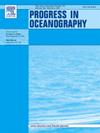基线问题:不同海洋热浪基线的挑战和影响
IF 3.6
3区 地球科学
Q1 OCEANOGRAPHY
引用次数: 0
摘要
海洋热浪(MHWs)是指长时间的海洋异常高温,对全球生态系统产生重大影响。然而,关于这些极端事件的定义一直存在争议,这对于海洋科学家、决策者和广大公众之间的有效研究和交流至关重要。所有MHW分析的基础是明确定义的背景海洋气候,即确定MHW的温度“基线”。虽然实施基线的单一方法可能不适合所有MHW研究应用,但分析MHW的基线选择必须是有意的,因为它会影响研究结果。这一视角考察了基线选择,并讨论了它们对海洋生物和生态系统风险的影响,以及它们在向利益相关者、决策者和公众传达MHW特征和指标方面的相关性。我们特别分析了计算MHW统计数据的五种不同的基线方法,评估了它们的技术差异,并讨论了它们的生态影响。不同的基线表明,在变暖的世界中,MHW特征的趋势差异很大。例如,这将意味着未来风险的差异,反映出具有不同适应潜力的海洋生物,从而影响对管理战略的建议。我们还研究了不同基线选择对易于实施和与更广泛受众沟通的影响。我们的分析强调有必要明确指定MHW研究中选定的基线,并注意其对MHW统计、实际考虑以及对海洋生物、生态系统和人类系统适应能力的解释的影响。本文所强调的不同极端气候基线的挑战和影响在其他极端气候分支的研究和交流中也具有类似的相关性。本文章由计算机程序翻译,如有差异,请以英文原文为准。
Baseline matters: Challenges and implications of different marine heatwave baselines
Marine heatwaves (MHWs), prolonged periods of unusually high ocean temperatures, significantly impact global ecosystems. However, there is ongoing debate regarding the definition of these extreme events, which is crucial for effective research and communication among marine scientists, decision-makers, and the broader public. Fundamental to all MHW analyses is a clearly defined background oceanic climate – i.e., a temperature ‘baseline’ against which the MHW is defined. While a single approach to implementing a baseline may not be suitable for all MHW research applications, the choice of a baseline for analysing MHWs must be intentional as it affects research outcomes.
This perspective examines baseline choices and discusses their implications for marine organism and ecosystem risks, and their relevance in communicating MHW characteristics and metrics to stakeholders, policymakers, and the public. In particular we analyse five different baseline approaches for computing MHW statistics, assess their technical differences, and discuss their ecological implications. Different baselines suggest widely different trends in MHW characteristics in a warming world. This would, for example, imply differences in future risk, reflective of marine organisms with different adaptive potential, thereby affecting recommendations for management strategies. We also examine the consequences of different baseline choices on ease of implementation and communication with wider audiences. Our analyses highlight the need to clearly specify a chosen baseline in MHW studies, and to be mindful of its implications for MHW statistics, practical considerations, and interpretations concerning the adaptive capacities of marine organisms, ecosystems and human systems. The challenges and implications of different MHW baselines highlighted here have similar relevance in research and communication for other branches of climate extremes.
求助全文
通过发布文献求助,成功后即可免费获取论文全文。
去求助
来源期刊

Progress in Oceanography
地学-海洋学
CiteScore
7.20
自引率
4.90%
发文量
138
审稿时长
3 months
期刊介绍:
Progress in Oceanography publishes the longer, more comprehensive papers that most oceanographers feel are necessary, on occasion, to do justice to their work. Contributions are generally either a review of an aspect of oceanography or a treatise on an expanding oceanographic subject. The articles cover the entire spectrum of disciplines within the science of oceanography. Occasionally volumes are devoted to collections of papers and conference proceedings of exceptional interest. Essential reading for all oceanographers.
 求助内容:
求助内容: 应助结果提醒方式:
应助结果提醒方式:


